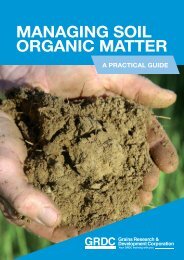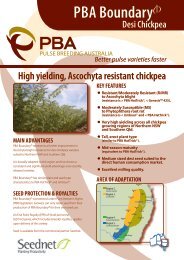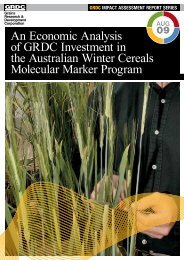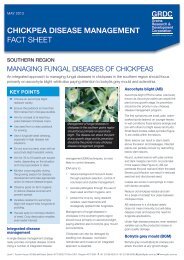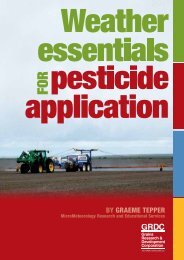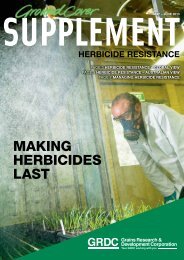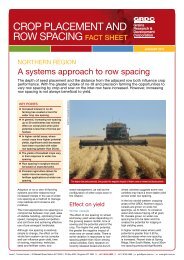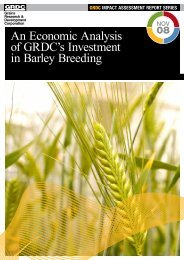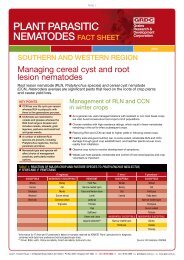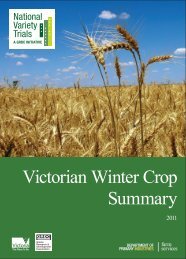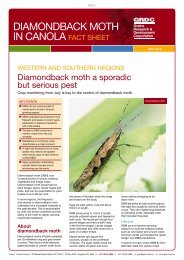impact assessment report series - Grains Research & Development ...
impact assessment report series - Grains Research & Development ...
impact assessment report series - Grains Research & Development ...
You also want an ePaper? Increase the reach of your titles
YUMPU automatically turns print PDFs into web optimized ePapers that Google loves.
The benefits from the investment in the Cluster are those additional to the benefits<br />
that would have occurred if GRDC had not invested. The counterfactual scenario<br />
(the benefits if GRDC had not invested) are detailed in Section 7.5. The major<br />
assumption in defining the counterfactual is that the research effort in soil biology<br />
would have been reduced substantially.<br />
7.1 Inoculants (nutrient increasing)<br />
Benefits from use of inoculants<br />
The first of the naturally occurring inoculants subject to testing by the Soil Biology<br />
cluster was Penicillium radicum, first developed in Australia during the 1990s prior to<br />
any involvement from the Soil Biology Program. Seed inoculation with P. radicum<br />
(now known as Pr70RELEASE marketed by Becker Underwood) was initially<br />
promoted to some extent as the Australian equivalent of the successful Canadian<br />
inoculant P. bilaii. Phosphate-solubilising activity was seen as the key property.<br />
However the CSO223 project demonstrated that P. radicum was more likely a growth<br />
stimulant that produced varied even unpredictable results, but best when used on<br />
acidic soils with low fertility and low root disease problems (Wakelin and Ryder<br />
2004). It could be argued that there were benefits from adoption avoided. Better<br />
information would result in farmers avoiding wasting further funds and yield losses<br />
where a response was unlikely. But although several years have passed since the<br />
clarification emerged, P.radicum does not appear to have been repositioned, and has<br />
not achieved a significant market presence. The benefit estimation will therefore<br />
concentrate on products where there has been a significant contribution from the Soil<br />
Biology Program and which are part of the GRDC joint venture with Novozymes<br />
Biologicals Australia. However the estimates will need to recognise that new<br />
competitive products may emerge as farmers increasingly seek innovative<br />
approaches to crop nutrition.<br />
Two inoculants, JumpStart and TagTeam are in the process of being launched by<br />
Novozymes Biologicals Australia. JumpStart is a formulation based on P. bilaii which<br />
is applied as a seed dressing. As the brochure (Novozymes Biologicals Australia<br />
2009) states: “P.bilaii is a naturally occurring soil fungus discovered by Agriculture<br />
and Agri-Food Canada. It colonises (grows along) plant roots, releasing organic acids<br />
that release the “bound” mineral forms of less available soil and fertiliser phosphate,<br />
making it immediately available for the crop to use”.<br />
TagTeam, available in 2009 has a dual mode of action as it includes P. bilaii and<br />
rhizobia for their traditional role in N fixation in association with legume crops and<br />
pastures. JumpStart is awaiting regulatory approval for a possible launch in 2010.<br />
Two projects in Theme 1 were the vehicle for early field evaluation of inoculant<br />
products. In addition the project CSO00044 (classified as Other) has tested<br />
penicillium inoculants in Australia and Northern America to develop a better<br />
understanding of their rhizosphere ecology, genetic stability and the mechanisms<br />
associated with enhancing P-availability in soils and plant-growth-promotion. This<br />
will provide a better understanding of which inoculants to use under particular agroecological<br />
conditions for increased efficacy and consistent performance (Harvey et al<br />
2009). Soil acidity is one of the key factors influencing phosphate availability.<br />
Farmers will see soil acidity as important in determining the likely response to<br />
inoculants on the range of acidic and alkaline soils in southern Australia. The<br />
Novozymes Biologicals Australia brochure states that phosphate is most available on<br />
soils of pH 6.5 to 7 (slightly acid to neutral).<br />
_________________________________________________________________<br />
Agtrans <strong>Research</strong> Page 22




